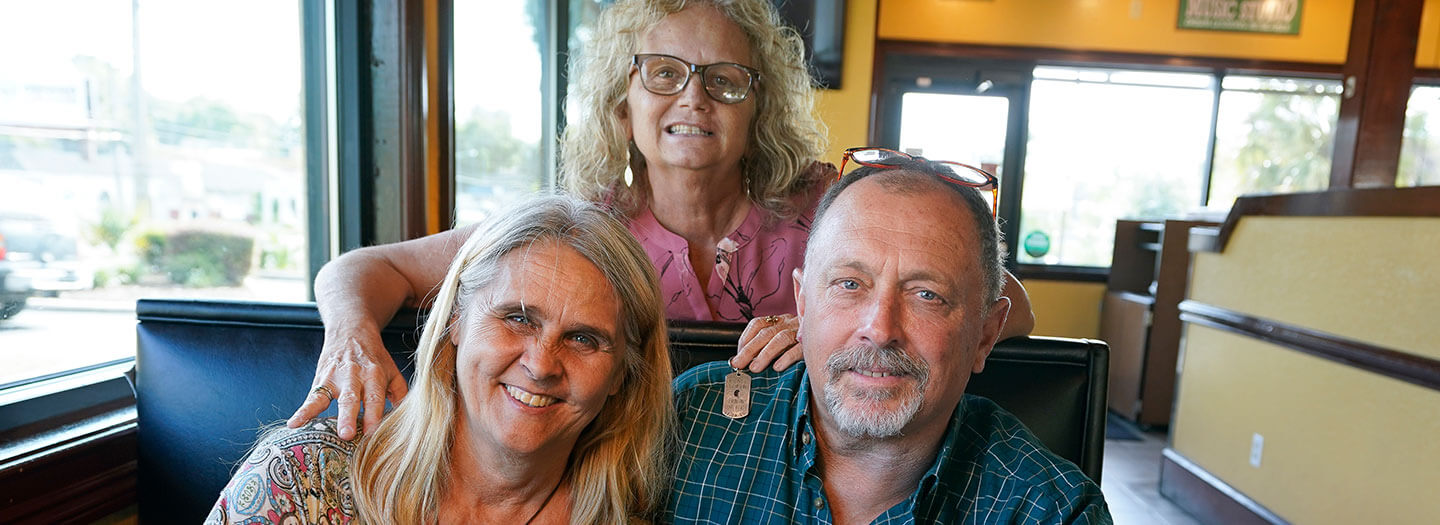[ad_1]

Debby Neal-Strickland recently married her longtime sweetheart, Jim Merthe, at their Florida church. Two days later, she donated a kidney to Jim’s first wife, Mylaen.
Jim and Mylaen have been divorced for nearly two decades, but they have gotten along well as they raised their two children. Mylaen has long struggled with kidney disease. By last year, the Associated Press reports that “she was ghostly pale with dark circles under her eyes, dragging herself through the workday with no energy.” She was admitted to the hospital last November when her kidneys were functioning at only 8 percent.
Debby had watched her brother die of cystic fibrosis while awaiting a double lung transplant. “When somebody needs an organ, if they don’t get it, they’re probably not going to make it. I know it’s something that you do quickly,” she said.
So Debby volunteered to be a donor for Mylaen. She passed the initial match for blood and tissue and began more complex testing while juggling their house filled with six children, including a six-year-old girl with autism and five teenagers. Some of the children are Debby’s biological grandchildren and some they are fostering.
After months of testing and COVID-19 delays, the transplant was set for two days after Debby’s wedding. They married on November 22. Debby said, “It was the most amazing day of my life, until two days later. That was also the most amazing day of my life.”
As soon as Debby regained consciousness following the surgery, she asked about Mylaen. A few floors below, Mylaen was also pleading with the nurses: “I need to see her.” Despite strict COVID-19 protocols, Jim was eventually allowed to wheel his new wife into the hospital room to see his ex-wife.
The two now call themselves kidney sisters. They pray for each other and are planning a big family trip this summer. “This is what the world is about. Family. We need to stick together,” Mylaen said. “She saved my life.”
When Jesus shocked Peter
Mylaen is right.
In a recent website article, I stated that community is a vital component in mental health. Now let’s note an additional step: unconditional community requires sacrifice.
We live in an existentialistic culture that makes us consumers and teaches us that life is all about us. “Look out for Number One,” we’re told. Personal authenticity is the path to flourishing, our society insists.
In such a world, people are always a means to our end. Tolerating others so they will tolerate us is the best we can do. But tolerance is shifting sand for true community. We will support and encourage each other only so long as doing so benefits us.
By contrast, God’s word consistently calls us to love each other unconditionally, to forgive each other absolutely, and to be for each other passionately.
Here’s an example. In Matthew 18, Peter asked Jesus, “Lord, how often will my brother sin against me and I forgive him? As many as seven times?” (v. 21). Peter thought he was being exceedingly generous. Jesus’ reply must have shocked him: “I do not say to you seven times, but seventy-seven times” (v. 22). Our Lord’s point was not that we can seek vengeance on the seventy-eighth time but that our forgiveness should be consistent and absolute.
I am not suggesting that sins have no consequences or that we should position ourselves to be hurt by those who have hurt us in the past or might hurt us in the present. Rather, I am pointing to the biblical call to seek community with others, even when such community is hard.
Often, we must take the first step, knowing that others may then respond. Even if they do not, we will know that we have done what we can do to build the kind of community that honors the Lord and blesses us.
“Anger is possibly the most fun”
Of course, vengeance is often more appealing than community. Frederick Buechner noted: “Of the Seven Deadly Sins, anger is possibly the most fun. To lick your wounds, to smack your lips over grievances long past, to roll over your tongue the prospect of bitter confrontations still to come, to savor to the last toothsome morsel both the pain you are given and the pain you are giving back–in many ways it is a feast fit for a king. The chief drawback is that what you are wolfing down is yourself. The skeleton at the feast is you.”
If your next step into community were easy, you would probably have taken it already.
Who needs your forgiveness?
From whom do you need to seek forgiveness?
Who needs unconditional community with you?
With whom do you need such community?
If you’ll ask the Lord these questions, he’ll lead you to the answers and to the community for which you were made.
Why not today?
[ad_2]
Source link

